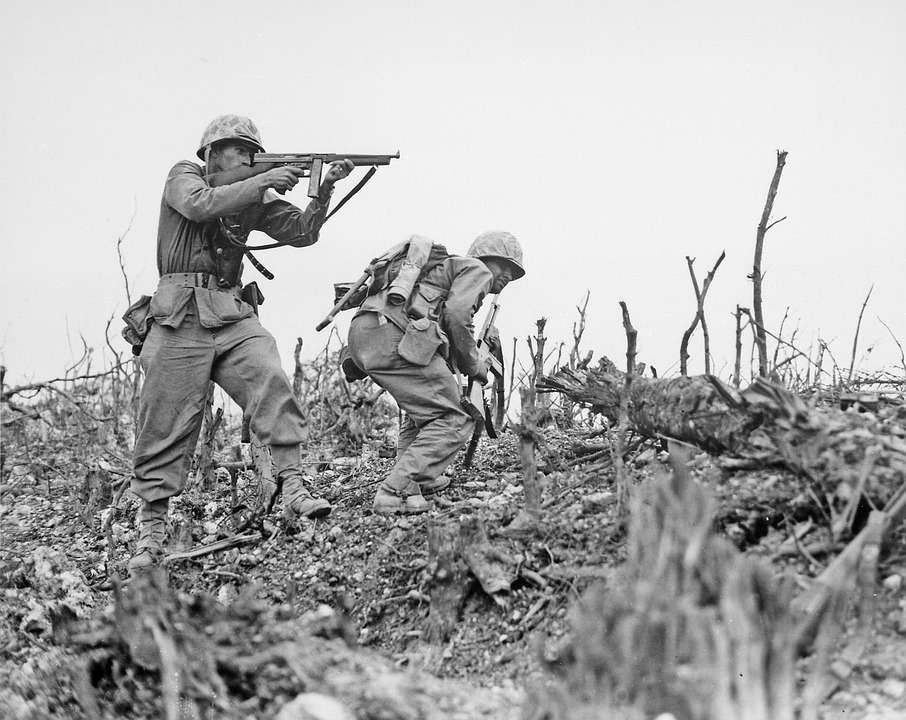World War 2| World War 2
is the due to the World War 1. In World War 2 Germany want their territory back
which was taken from them in World war 1. World War 2 is the deadliest war in
the history having the highest no. of deaths. In this topic we will discuss
world war 2 in the shortest way possible very quick. Why World war 2 started?
When was it Started? Who Won World War 2? All these and many more questioned
will be answered here in this topic. So lets start:

World War 2 :
It is the biggest equipped
clash that humankind has known. A destructive war that included a huge number
of contenders around the globe. At the end of World War I, Germany and its
allies are defeated and held solely responsible for the war. With overwhelming
authorizations forced upon them, the Austro-Hungarian and Ottoman domains are
disassembled, while Germany needs to reimburse what many think about a
nonsensical obligation. Its colonies and some of its territories are ceded to
the victors, and to Poland which is recreated. These sanctions are seen as
humiliation by the German people. The German economy is weakened by excessive
debt and suffers hyperinflation. National mints try to address this by printing
banknotes, causing a devaluation of its currency. Between 1914 and November
1923, the value of the mark grew by 1,000 billion. The next year, radical
measures are taken to end expansion and balance out and resuscitate the
economy. But in 1929 the Wall Street crash in New York causes the worst
economic crisis of the 20th century. Its effect is felt around the world, with
Germany not saved either, causing the joblessness rate to detonate. Seriously
debilitated, Germany sees an ascent of patriotism in 1933 that permits the
ascent to intensity of the Nazi party with Adolf Hitler at its steerage. In
spite of the severe conditions forced upon Germany after WWI, the new
authoritarian system resets the nation and reestablishes military assistance. The
country also begins an aggressive foreign policy with the dream of uniting all
German-speaking people. Italy, despite its victory with the Allies, is
frustrated by the amount of territory it gained after World War 1. Since 1922,
the country is ruled by the dictatorial fascist party of Benito Mussolini.
Italy begins a colonial policy by seizing Ethiopia and prepares an invasion of
Albania. In Spain, starts three years of common war restricting the Republican
government who're upheld by the USSR and the International Brigades, and the
patriot camp drove by Francisco Franco, and helped by Italy and Germany. The
two countries took the opportunity to test their armies and to get closer
diplomatically. In Asia, Japan continues its expansionist policy. The nation
exploits the common war in China to attack new domains. The Japanese armed
force utilizes synthetic and organic weapons and submits slaughters of populaces,
Germany is presently ground-breaking enough to dispatch its regional extension.
It originally attached Austria with help from the neighborhood Nazi gathering.
Next, the west of Czechoslovakia was attacked. The Slovak Republic turns into a
German satellite state while Hungary develops nearer carefully. After the
control of a piece of Lithuania, Germany signs with the USSR a peace settlement
and an arrangement to cut up Europe. It at that point assaults Poland, which
incites the United Kingdom and France to announce war, denoting the start of
World War II. In spite of the fact that the German powers are amassed in the
East, the Allied soldiers don't step up to the plate in the West. Rather,
France and the United Kingdom attempt to cut the vital iron metal course that
goes through Norway and supplies the German military industry. In 1940 Germany
reacts by invading Denmark and Norway. Inside days, the nation catches
Luxembourg, the Netherlands and Belgium. Hitler's new military technique is
called Blitzkrieg, which shocks restriction safeguards with fast, high-power
assaults in a concentrated region. English powers retreat even with this German
military ability, and the German armed force weighs down on Paris. The French
army is defeated and an armistice is signed. Germany possesses the north and
west of France, leaving its other domain and provinces heavily influenced by
the new government. Germany hence has aberrant control of French states without
sending a military there. Be that as it may, portions of the French settlements
and the Belgian Congo decides to remain in the camp of the Allies. In London,
which already hosts several governments in exile, General Charles de Gaulle
creates Free France which continues to fight Nazi Germany. Brazzaville is named
as its capital.

Internationalization of World War 2 :
In 1940, Pursuant to agreements signed with Germany, the Soviet Union seizes the Baltic states and a part of Romania. Germany, Italy and Japan consolidate to frame the Axis Powers. All territories and British states, except for Ireland, enter the war. In Africa, battling starts between Italian provinces and Allied powers. While in Europe, in spite of the enormous ethereal shelling of British urban communities, Germany neglects to assume control over the nation. Hitler at that point changes his arrangements: he currently needs to attack the USSR. But the plan is delayed by Italy, that fails to invade Greece and is forced to retreat by Allied forces. After the promotion of Hungary, Romania and Bulgaria to the Axis powers, the German militaries head south to attack Yugoslavia and Greece. Wherever in Europe, the obstruction is composed in various structures. Some of the time, individuals sort out strikes, exhibits or ensure needed people. A few gatherings spy for the Allies, direct harm or print opposition papers. In Eastern Europe, guerilla forces undermine the Axis armies. In Yugoslavia and Greece, safe socialists and traditionalist gatherings face one another. Germany isn't saved the counter Nazi obstruction, with certain endeavors to kill Hitler … which come up short.

Normandy Supply
On June 22 1941, Axis powers propelled - on certain checks - the biggest military activity in history to assault USSR, which presently passes accepted into the camp of Allied powers. The bulk of the German troops, well equipped and motorized, rush to the east. To help the Soviets, Allies involve Iran which at that point opens up a gracefully course through the Caucasus. German armed forces show up in Leningrad and start an attack of the city that would most recent 872 days and cause more than 1 million non military personnel passings. Further south, German soldiers were halted at the entryways of Moscow, where they endure a brutal and fatal winter. Behind the bleeding edges, the SS slaughter Slavic and Jewish populaces. In Asia, Japan possesses French Indochina. To counter its expansionist policy, the United States imposes upon it an embargo on oil and steel. In response, the Japanese conduct a surprise attack on the United States at Pearl Harbor. A huge ethereal bombarding harms an enormous piece of the US maritime armada. The United States enters the war on the Allied side. From the start, they focus their powers on the Pacific front. The nation likewise gives supplies to the USSR, which keeps opposing the German development. Japan, for its part, conquers new territories in the Pacific.

In addition to the
massacres, Japan sends 10 million Chinese civilians into forced labor camps. In
Indonesia, a great many detainees endure a similar destiny on the island of
Java. In Burma and Thailand, Allied detainees are depleted in the development
of a railroad line. Moreover, hundreds of thousands of women are forcibly
recruited into prostitution for the Japanese army. In Europe, fixation and
annihilation camps are worked to slaughter, among others, Jews, opposition
contenders, political rivals, wanderers, gay people and individuals with
inabilities. Dreading a second front in Europe, Hitler fabricated the Atlantic
Wall, a progression of army bases shielding the coast from intrusion. But the
Allies first landed in Morocco and Algeria. Italian Libya finds itself caught
between two fronts. Having lost control of its provinces, Vichy France is
attacked. In the East, Axis powers attempt to cut the flexibly course of the
Caucasus. But for the first time, the German offensive undergoes a major
military setback. The Soviets take the initiative and counterattack. Africa is
presently completely constrained by Allies who compose an arrival in Sicily. The
new Italian government demands a peace negotiation, making the Germans attack.
The USSR propels quickly toward the west, constraining the German armed force
to focus on that front. On June 6, 1944, the Allies land in Normandy. Their
armed forces rapidly dominate and free Paris. In the West, as in the East,
nations are freed or switch camps. With triumph in sight, Allied forces report
the formation of the United Nations. Countries that declared war on Germany and
Japan would be admitted at its founding conference. This triggers an influx of
assertions of war however without significant outcome.

Cologne Bombings
War Conclusion :
On April 30 1945, Hitler
commits suicide in his bunker just before the arrival of the Soviets. Eight
days later, the country surrenders. The United States and USSR unite to beat
the Empire of Japan. The Soviets began a military invasion via Manchuria while
the US drops two atomic bombs on Hiroshima and Nagasaki. On August 15, Japan
gives up, denoting the finish of World War II. Following 6 years of war, the
human cost is overwhelming with in any event 60 million dead, for the most part
regular people. Numerous urban communities are totally devastated. Europe and
the USSR subject a great many German detainees of war to fortified work, huge
numbers of whom would pass on. Germany and Austria are carved up among the
victors. The old watchman of European forces are left depleted and demolished
by war. The United States and USSR rise as the staying worldwide superpowers. Despite
the role of the UN, which aims to maintain peace and international security,
both sides would eventually engage in indirect confrontations around the world
results in the Cold War.

So that’s all about the
topic “World War 2. When was world war 2? Who won World War 2?”. If you want to give credit to this topic then click on any of ads. Thanks for giving
time to read it and if you like it then don’t forget to share it.
Thank You






0 Comments
Please Do not enter any spam link in the comment box.